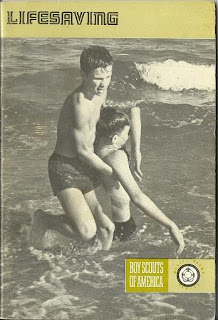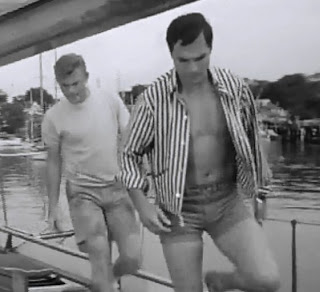Although Ralph Macchio's earlier movies (
Up the Academy, High Powder, The Outsiders) featured significant buddy bonding,
The Karate Kid (1984) based its success on a demonstration of straightness. The first scene is a tease: New Jersey transplant Daniel (Ralph) meets boy-next-door Freddy (Israel Juarbe), who looks embarrassingly love-struck and can't stop inviting Daniel to do things, first karate lessons and then a beach party.
But just when we think this will be a teenage romance, the rich-kid bully who runs the town (William Zabka) forces Freddy to break up with Daniel, and he disappears until the final scene, where he is in the crowd of well-wishers at the big karate tournament.
The rest of the movie effectively eliminates moments that might mean something by depictng every teenage boy, without exception, as cruel, violent, vicious, and seething with unexplained anti-Daniel hate. Every word boys say is a boast, an insult, or a threat. They wear skeleton costumes to the Halloween party to demonstrate their evil, and their karate uniforms are black to contrast with Daniel's Luke Skywalker white. In contrast, every girl Daniel encounters is an angel, nurturing, supportive, tolerant, and kind. This is heterosexism run rampant, proof positive that same-sex love, friendship, or even polite co-existence is utterly impossible. Love, friendship, and even the freedom to walk across the cafeteria without harassment can occur only in the company of girls.

Sports underdogs are always tutored by outsiders who lack jobs and wives and are therefore sexually suspect, so Mr. Miyagi (Pat Morita), the apartment complex janitor who teaches Daniel karate, might have added a homoerotic subtext. The two become best friends; Miyagi gives Daniel a birthday cake, and Daniel helps Miyagi into bed after a drinking binge.
The DVD box shows them face to face, mouth to mouth, gazing at each other as if moving in for a kiss. But Miyagi is elderly and Asian,
movie code for "asexual." And, so no one worries that a stray look might mean something, Miyagi is shown drinking to the memory of his dead wife, thus "proving" that he is heterosexual.
After
The Karate Kid, Ralph's baby face and soulful puppy-dog eyes allowed him to play teenagers well past his thirtieth birthday.
Usually he was thrown into worlds so heavily polarized into vicious boys and nice girls that same-sex intimacy seemed absurd. In
Karate Kid II (1986), both Daniel and Mr. Miyagi both fight cruel, violent boys and get girls.
In
Crossroads (1986), the guitar substitutes for karate, and an elderly black man for the elderly Asian man, but still, nothing but cruel, violent boys and kind, loving girls.
In
Distant Thunder (1988), en route to a reunion with his elderly father, Ralph and a kind, loving girl are kidnapped by her cruel, violent boyfriend (Reb Brown).
Not until
My Cousin Vinny (1992) did Ralph bond with a boy, a fellow college student waylaid by a murder charge in Alabama. By that time, an entire genre of
Ninja kids had evoked their own worlds of cruel, violent boys and kind, loving girls, rejecting the possibility of same-sex love over and over.
















